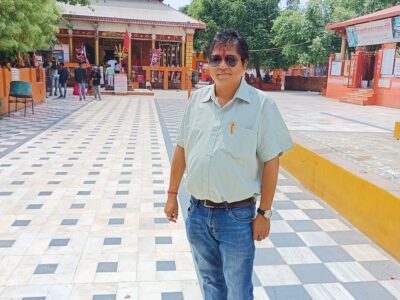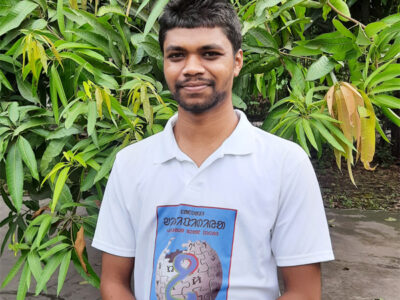Q&A: Meet Biyanto Rebin, Javanese/Indonesian language activist

Biyanto Rebin, Javanese/Indonesian language activist. Photo by Rachmat04 for Wikimedia Indonesia / CC BY-SA.
Following last year's successful social media campaign celebrating linguistic diversity online throughout Asia, the collaborative project is continuing in 2020. Every week, a different language activist and advocate will be taking turns managing the @AsiaLangsOnline Twitter account to share their experiences, best practices, and lessons learned from their revitalization work promoting the use of their native languages, with a special focus on the role of the internet. This campaign is a collaboration between Rising Voices, the Digital Empowerment Foundation, and the O Foundation.
Each week, the upcoming host will answer several questions about their background and give a brief overview of their language. This Q&A is with Biyanto Rebin (@meenyo) who will provide a sneak preview of what he will be discussing during his week as host.
Rising Voices (RV): Please tell us about yourself.
Biyanto Rebin (BR): My name is Biyanto Rebin. I am a language and linguistics enthusiast. My language interests have been growing constantly since high school. I took Chinese studies in my undergraduate degree and several languages as my minor, including Italian. My language activism is strengthened by my contribution to Wikipedia, where I've been active on the Indonesian and Javanese editions since 2006. Besides Wikipedia, I also contribute to Wiktionary and Tatoeba to increase and enrich the Indonesian and Javanese entries.
RV: What is the current status of your language on the internet and offline?
BR: Since I work for Wikimedia Indonesia, I get involved, participate, and dedicate myself to encouraging growth, development and the free dissemination of knowledge in Indonesian language and other languages spoken in Indonesia. Wikimedia Indonesia is a non-profit organization and an independent local partner of the Wikimedia Foundation, whose work appears on worldwide platforms such as Wikipedia and other wiki projects. As the chair of Wikimedia Indonesia, I draft and implement the annual plan to invite more people to join our movements. We want to make sure that everyone can get free access in their preferred languages. Local languages are what we aim for. We engage and communicate constantly with local people to build their own local language community. Our dedication started bearing fruit several years ago, and we finally have Wikipedia in Balinese and Gorontalo as well as a Minangkabau version of Wiktionary, thanks to our great volunteers who constantly help and collaborate with us to deliver this wonderful result.
RV: What topics do you plan to focus on during the week that you’ll manage the @AsiaLangsOnline Twitter account?
BR: I want to tweet about local language struggles [pdf] and relate this with the promotion of Indonesian as our national language and why we need to preserve our local languages [pdf].
RV: What are the main motivations for your digital activism for your language? What are your hopes and dreams for your language?
BR: I want everyone to be able to freely access knowledge in their own language. Their mother language is as important as the major language. I hope our rich language diversity can be preserved, as its uniqueness is irreplaceable.
Support our work
Since Rising Voices launched in 2007, we’ve supported nearly 100 underrepresented communities through training, mentoring, microgrants and connections with peer networks. Our support has helped these groups develop bottom-up approaches to using technology and the internet to meet their needs and enhance their lives.
Please consider making a donation to help us continue this work.



